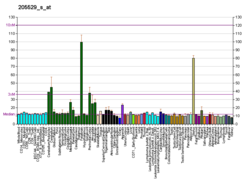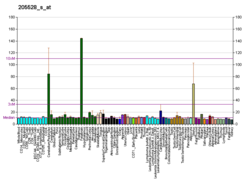| RUNX1T1 | |||||||||||||||||||||||||||||||||||||||||||||||
|---|---|---|---|---|---|---|---|---|---|---|---|---|---|---|---|---|---|---|---|---|---|---|---|---|---|---|---|---|---|---|---|---|---|---|---|---|---|---|---|---|---|---|---|---|---|---|---|
 | |||||||||||||||||||||||||||||||||||||||||||||||
| |||||||||||||||||||||||||||||||||||||||||||||||
| Identifiers | |||||||||||||||||||||||||||||||||||||||||||||||
| Aliases | RUNX1T1 , AML1T1, CBFA2T1, CDR, ETO, MTG8, ZMYND2, AML1-MTG8, t(8;21)(q22;q22), RUNX1 translocation partner 1, RUNX1 partner transcriptional co-repressor 1 | ||||||||||||||||||||||||||||||||||||||||||||||
| External IDs | OMIM: 133435; MGI: 104793; HomoloGene: 3801; GeneCards: RUNX1T1; OMA:RUNX1T1 - orthologs | ||||||||||||||||||||||||||||||||||||||||||||||
| |||||||||||||||||||||||||||||||||||||||||||||||
| |||||||||||||||||||||||||||||||||||||||||||||||
| |||||||||||||||||||||||||||||||||||||||||||||||
| |||||||||||||||||||||||||||||||||||||||||||||||
| |||||||||||||||||||||||||||||||||||||||||||||||
| Wikidata | |||||||||||||||||||||||||||||||||||||||||||||||
| |||||||||||||||||||||||||||||||||||||||||||||||
Protein CBFA2T1 is a protein that in humans is encoded by the RUNX1T1 gene. [5] [6] [7]









